30 Survival Weapons For Your SHTF Arsenal is available on http://totalsurvival.net/
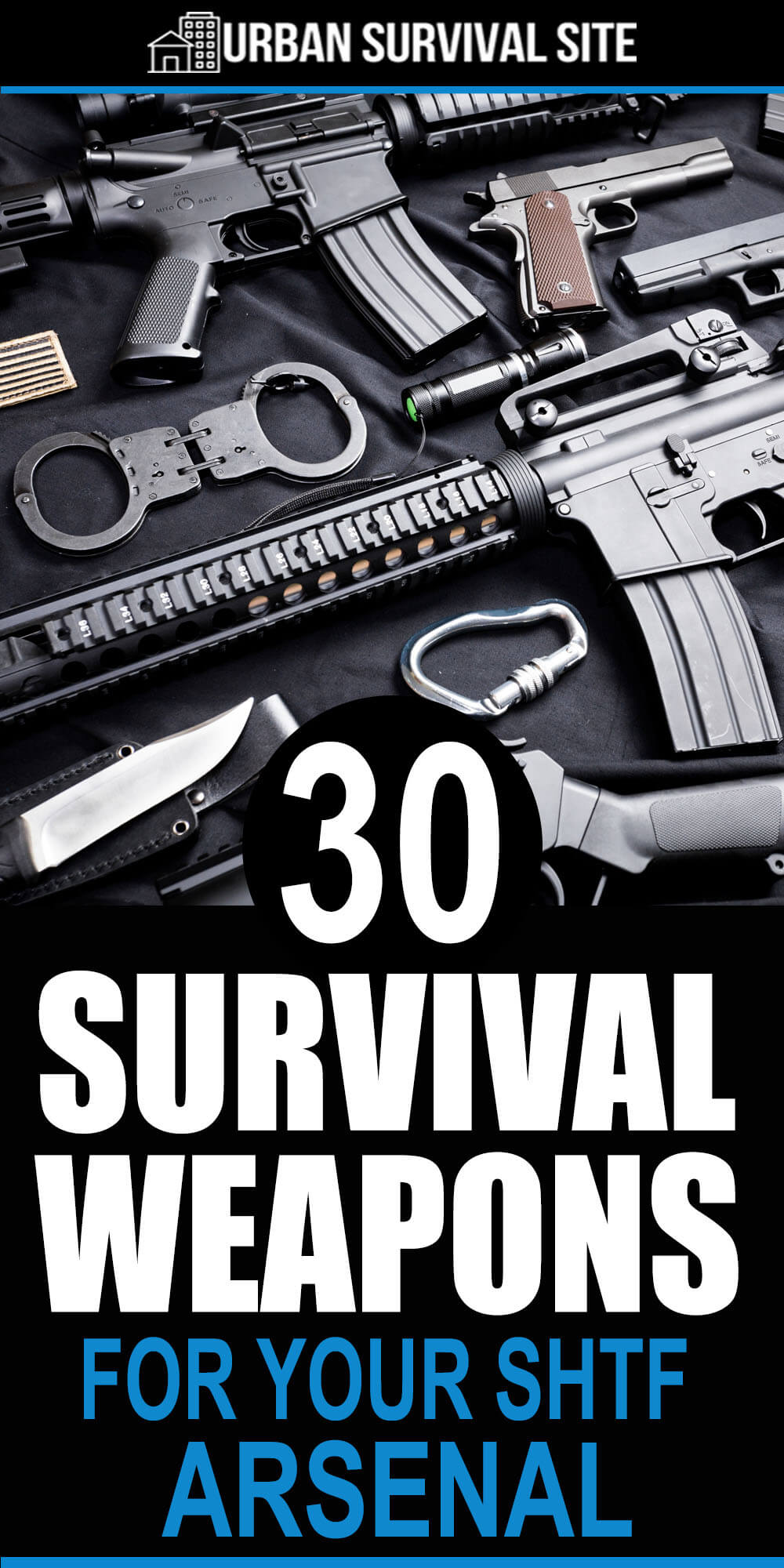

 In any grid-down disaster scenario, security should be a top priority. There will be criminals taking advantage of the lack of law enforcement, which means there will be looters ransacking stores and neighborhoods. Not to mention unprepared average joes who might want to take your supplies for themselves. So whether you like weapons or not, they will be an absolute necessity when the SHTF.
In any grid-down disaster scenario, security should be a top priority. There will be criminals taking advantage of the lack of law enforcement, which means there will be looters ransacking stores and neighborhoods. Not to mention unprepared average joes who might want to take your supplies for themselves. So whether you like weapons or not, they will be an absolute necessity when the SHTF.
Want to save this post for later? Click Here to Pin It on Pinterest!
In addition to self-defense, weapons can be used for hunting, which could be crucial is certain scenarios. In fact, not having weapons as part of your preparation (or not being trained in the use of your weapons) means your chances of dying in a serious disaster will be higher.
This article will serve as the ultimate list of survival weapons that you should consider getting for your arsenal, including both firearms and non-firearms. Without any further ado, let’s dive right in.
Firearms
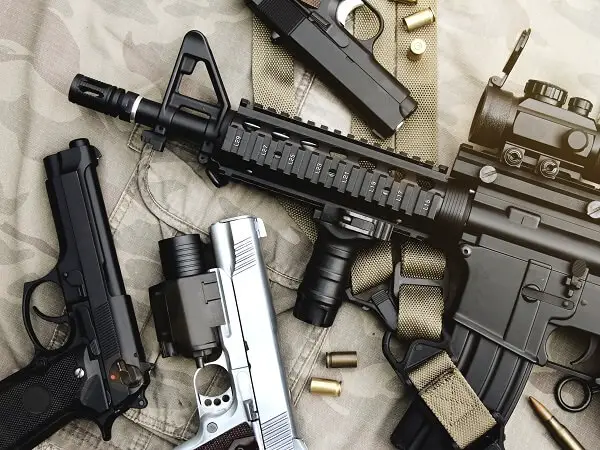


Here is a list of the primary firearms that you should consider having in your survival arsenal:
.22 Rifle
A .22 rifle can be used for casual plinking, small game hunting, pest control, general homestead use, and even defense in a survival situation.
There’s an old saying that no gun collection is truly complete without a .22 rifle, and it’s absolutely true. Out of all of the firearms on this list, the .22 is the one that is the most often underestimated.
Examples of .22 semi-automatic rifles you can buy include the Marlin Model 60 and the Ruger 10/22. Here’s a list of the best survival rifles to have after SHTF.
Shotgun
A twelve or twenty gauge pump action shotgun will without question be one of the most effective self-defense weapons you can own.
Another valuable reason to own a shotgun is because of the versatility of ammunition. While buckshot can be used effectively for defense at relatively close range, birdshot is effective for bird and small game hunting, while slugs can be used for big game hunting within reasonable distances.
Examples of shotguns in this category include the Mossberg 500, Remington 870, and Winchester SXP.
Handgun
While a handgun should never be treated as a primary weapon (use a rifle or a shotgun for that), it is without question a very valuable backup weapon and something you can have on your person at all times (and have concealed).
The best type of handgun to use will be a mid-sized 9mm pistol that has a large magazine capacity while also being fairly easy to conceal. Examples of pistols in this category include the CZ P10C, the Glock 19, the Smith & Wesson M&P9 2.0 Compact, and the Walther PPQ.
If you opt for a revolver for simpler operation, make sure you get a model chambered for .357 Magnum, as you can also shoot .38 Specials to increase its versatility. Examples of full size .357 revolvers that would be good options include the Ruger GP100, the Smith & Wesson 686, and the Taurus Model 66.
Defensive Rifle
A defensive semi-automatic rifle chambered in an intermediate caliber such as 5.56 will be an excellent option for defending yourself and your home from multiple attackers. It can also be used for hunting mid-sized game such as deer or wild hogs as well.
Examples of rifles in this category include the AR-15, AK-47, and Ruger Mini-14.
Long-Range Rifle
Last but not least, a long range rifle chambered in a larger caliber such as .308 or .30-06 or something similar will be an effective firearm for big game hunting and anti-personnel use at long distances.
You can go with semi-automatic rifles such as the AR-10 or the Springfield M1A, or bolt action options include the Mossberg Patriot, Remington Model 700, Ruger American, Ruger Model 77 Hawkeye, and the Winchester Model 70.
Sharp Weapons
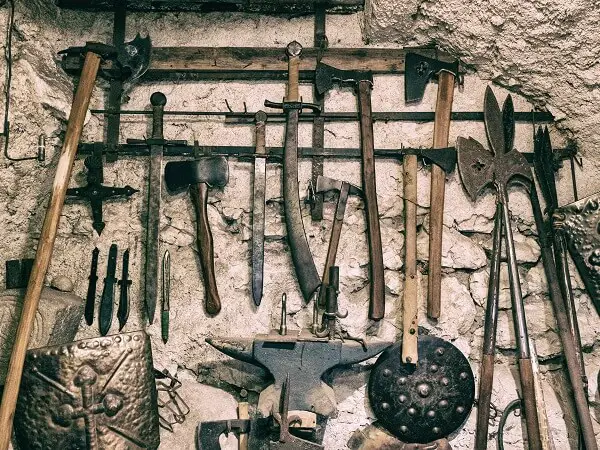


Here are the primary sharp weapons that you will need to have in a survival situation:
Ax
You ought to have an ax anyway so you can chop firewood in the winter. It’s also useful for breaking up ice, field dressing animals, and cutting up branches and foliage so you can build a shelter. But as a weapon, an ax is particularly deadly.
Knife
This is perhaps the most basic and important (if also obvious) survival weapon to have. But rather than just having a flimsy Swiss Army knife, you need to have a folding tactical knife that you can keep clipped to the inside of your pocket, as well as a larger fixed blade tactical knife such as the KA-BAR.
A knife can be a more effective defensive weapon than a gun at extremely close range, and it also fulfills a litany of other uses as well.
Kubotan
The Kubotan is a keychain self-defense weapon that has been around since the 1960s. It’s typically around five inches in length and half an inch in diameter, giving it the approximate size of a pen.
Kubotans can either have a sharp edge to punch holes in an attacker much like a tactical pen, or they can be used as blunt weapons. The best aspect about Kubotans is they can be easily concealed on your person.
Machete
The machete is thought of more as a utilitarian tool than as a weapon, but the truth is that it fits both roles very well. A machete can actually be even more effective than a knife for defense because it can help to keep an opponent at bay (not to mention that it can do a lot more damage).
Spear
Another weapon that can be very effective at keeping an opponent at bay is the spear. Simply tying a knife to the end of a pole with paracord or vine can make for a good defensive spear, but other spears you can make include a pointed spear (simply by sharpening the end of a pole and then fire hardening it) and a pronged spear (by taking a thicker pole and splitting the end into four or so prongs).
The pronged spear, besides being an effective defensive weapon, can also be used for effective fishing.
Tactical Pen
The tactical pen is without question one of the most overlooked defensive tools around today. A tactical pen is simply an ordinary pen encased in a durable metal housing and with a pointed end that will allow you to punch holes in an opponent.
One of the best things about a tactical pen is how innocent looking it looks and the fact that it does not draw attention to itself as a weapon (unlike a knife). And while you can technically use any pen as a weapon if you want to, there’s no question that a true tactical pen is much better suited to the task.
Right now, Ape Survival is giving away tactical pens in exchange for joining their newsletter. All you have to pay is the cost of shipping. See below:


Tomahawk
The tomahawk is simply a hatchet-like ax that is designed primarily for fighting. The tomahawks of today are very sharp and well-built, and also often have a knife-like pointed end on the opposite side, giving you essentially two weapons in one.
A tomahawk, like a normal hatchet, will also serve you with a number of important utilitarian purposes, such as being able to chop through wood or ice.
Close-Range Weapons
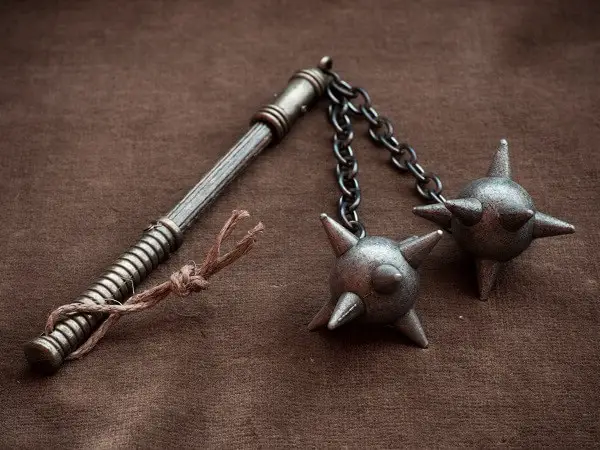


Here are the top blunt weapons that you should consider having in your arsenal:
Baseball Bat
The baseball bat can deliver a killing blow if you swing hard enough at an assailant’s head, and driving a nail through the end of it would double its effectiveness as well (as cliche as it may sound).
A durable metal bat would be a superior choice to a wooden option.
Belt
A belt is an example of an everyday item that can be used as a very effective defensive weapon that also gives you plenty of reach. If you sharpen the buckle, it will become even more effective and perhaps even lethal as a defensive tool. You can also use the belt to tie up an assailant after you have managed to subdue them, which gives it more uses than one.
Or you could just get a knife belt (a belt with a built-in knife). As with the tactical pen mentioned above, all you pay for the knife belt is the cost of shipping. See below:


Brass Knuckles
Brass knuckles are designed to simply increase your effectiveness significantly in a fist. Needless to say, being struck with brass knuckles is going to hurt a lot more than being struck with bare fists, not to mention that (with a hard enough blow), it can even break or severely damage one’s jaw.
Another benefit to brass knuckles is their lightweight and compact size, and you can easily carry them around in your pocket.
Cane
As with the belt, the cane is another everyday object that can be used defensively, although to get away with it inconspicuously, you would probably need to pretend to either have a limp (assuming you don’t have a real limp yourself) or be of a more advanced age.
But even if you don’t need to use (or pretend to use) a cane in your daily life, having one close by wouldn’t be a bad idea. Just make sure that the cane is a more durable model that can sustain a lot of abuse.
Club
The club is perhaps the most primitive of all weapons ever devised by man, and if you think about it, you can use almost any hard object as a club-like weapon if you have to.
But regardless of whether you want to use a primitive club (such as a rock tied tightly to a stick) or more modern options such as batons, there’s no denying that a club can deal a lot of physical damage.
Flail
The flail is perhaps the most medieval out of all of the weapons in this list: basically, it’s a two-handed handle attached to a chain which is attached to a spiked ball, at least traditionally speaking.
Today, you could construct a flail out of everyday objects: simply taking multiple grocery bags and then placing rocks in them before wrapping them shut would count as a makeshift flail, for example.
Hammer
The classic hammer can be a very effective weapon for defense and can incapacitate or even kill an attacking person with a single hard blow to the head. What more needs to be said?
Mace
I’m not talking about Mace brand pepper spray, but actual an actual mace. Basically, it’s a heavy club that has a metal head with spikes on one end. You see maces in movies set in medieval times, but you can still buy them today. They will do just as much damage as a flail, but they are easier to use.
Monkey Fist Knot
The monkey fist knot, also known as the Sailor Fist Knot, was originally designed by sailors as a way to strike an opponent without getting extremely up close.
Basically, the monkey fist knot is a rope or a string with the end rolled into a ball. The idea is that you can swing the ball in the air before delivering a blow to your assailant. Here’s a more detailed explanation.
Stun Gun
The terms ‘stun gun’ and ‘taser’ are often used interchangeably, when in reality they are two completely different weapons. A stun gun requires direct contact with your attacker in order to work, whereas a taser works from a distance.
Basically, a stun gun has at least two prongs attached to the end that can deliver an electric shock to an attacker. Both of the prongs should have electricity between them that cannot be visibly seen.
Umbrella
A good alternative to the cane is an umbrella. In fact, there are some umbrellas that are designed specifically for self-defense and not to break upon impact with an assailant, while still maintaining the look and weight of a normal umbrella (defensive umbrellas are usually built out of fiberglass).
While not the best offensive weapon, an umbrella can still be an excellent choice for protecting yourself from an attacker.
Distance Weapons
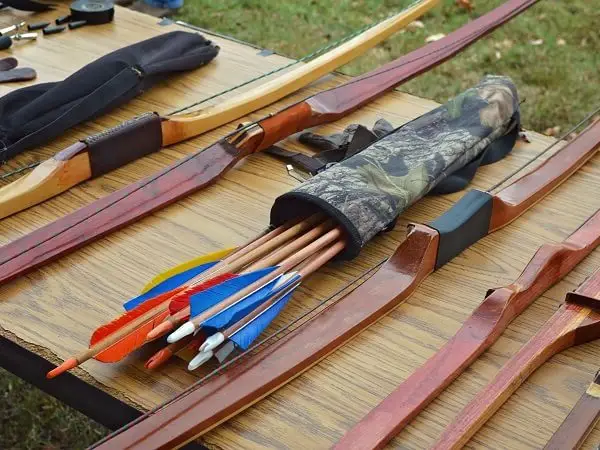


Here are some distance weapons that you should consider putting in your survival arsenal:
Bear Spray
Many people often confuse bear spray and pepper spray as being the same thing, but they’re a little different. Both bear spray and pepper spray contain oleoresin capsicum as their main ingredient, but bear spray has a much smaller concentration (around 10-15% less). The reason for this lesser concentration is because it is designed to irritate bears and get them to stop attacking you rather than actually hurt them.
Bear spray should be used primarily for bears and not for humans because it is not as effective as pepper spray. That being said, it certainly can be used for self-defense against humans if necessary.
Bola
The bola is a throwing weapon consisting of two weights on the ends of a cord. You then twirl the weights above your head before throwing them to trip and perhaps even injure an attacker (even though it should be noted that bolas were originally used for hunting or to capture wild game).
Bow And Arrow
The classic bow and arrow is a long distance weapon that can be used for both self-defense and for hunting. You have options from compound bow to recurve bows.
Just take note that becoming proficient with a bow and arrow is going to require a lot of practice (probably even more so than a firearm), so be prepared to invest a lot of time into learning and mastering it. Here is our guide to survival bows.
Crossbow
An alternative to the bow and arrow is a crossbow. As with the bow and arrow, the crossbow can be used for both hunting and self-defense. A big advantage to the crossbow is that it can be easier to learn and use than the more traditional bow and arrow.
Pepper Spray
If pepper spray is powerful enough to keep bears off of you, then it can certainly serve the same role against people as well. Pepper spray is designed so that an assailant’s eyes will swell and then close. Besides temporarily blinding and disorienting them, it also causes a lot of pain that they will almost certainly react to, hopefully giving yourself enough time to get away.
That’s also not to mention that pepper spray is very cost effective and is usually less than twenty dollars a can. Just be careful not to be downwind when you spray it, or else you can get some in your own face rather than your attacker’s.
Sling
A more primitive version of the slingshot is the sling. Basically, a hand sling is just two strings attached to a piece of fabric or canvas or leather, in which a small rock is held. You then twirl the rock above your head before letting loose.
Slings require a great deal of more practice than slingshots in order to master, but they can be used defensively if need be. Here is some information about the shepherd’s sling.
Slingshot
The slingshot is without question one of the most underestimated and overlooked weapons on the planet, for both hunting and defense. One of the best things about the slingshot is that ammunition for it is universal and literally everywhere. If you’re anywhere with pebbles or small stones on the ground, you have ammo.
Becoming accurate with a slingshot will take a lot of practice, but it can be accurate and powerful enough to bring down small game and also to temporarily stop an attacker (aim for the face). Here is an article about using slingshots for survival.
Taser
The main difference between a taser and a stun gun is that taser is designed to shoot probes, connected to wires, at your target. The probes can penetrate through clothing (and sometimes even skin) and then emit an electrical current that will shock your attacker.
Obviously, the primary benefit to using a taser over a stun gun is that you can (hopefully) stop your attacker before they get to you.
Throwing Stars
You don’t have to be a ninja to learn how to use throwing stars. Also known as ‘shurikens,’ throwing stars will have anywhere from three to eight sharped tips, each of which is capable of slicing through skin and flesh.
Throwing stars can be very effective at stopping or at least wounding an attacker before they get to you, but they also require a lot of practice and training in order to master.
Conclusion
We’ve covered a lot of weapons here, but don’t worry. You’re not doing anything wrong if you don’t have each and every one of these weapons in your arsenal. And it’s not like you’re going to be pack all of these weapons on you at once either.
That being said, each of these weapons fulfills a very unique and specific purpose and should prove valuable when the grid goes down. To begin accumulating these weapons if you haven’t already, you can make a list of what you feel are the most important ones to have, and then work your way from there.
Like this post? Don’t forget to Pin It on Pinterest!
This article first appeared on urbansurvivalsite.com See it hereOriginal Post Here: 30 Survival Weapons For Your SHTF Arsenal
No comments:
Post a Comment